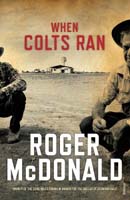 |
When Colts Ran Roger McDonald Random House 2010 |
[This novel has been shortlisted for the 2011 Miles Franklin Award, and for the 2011 Prime Minister's Literary Award.]
From the publisher's page:
In this sweeping epic of friendship, toil, hope and failed promise, multi-award-winning author Roger McDonald follows the story of Kingsley Colts as he chases the ghost of himself through the decades, and in and out of the lives and affections of the citizens of 'The Isabel', a slice of Australia scattered with prospectors, artists, no-hopers and visionaries. Against this spacious backdrop of sheep stations, timeless landscapes and the Five Alls pub, men play out their fates, conduct their rivalries and hope for the best.
Major Dunc Buckler, 'misplaced genius and authentic ratbag', scours the country for machinery in a World War that will never find him. Wayne Hovell, slave to 'moral duty', carries the physical and emotional scars of Colts's early rebellion, but also finds himself the keeper of his redemption. Normie Powell, son of a rugby-playing minister, finds his own mysticism as a naturalist, while warm-hearted stock dealer Alan Hooke longs for understanding in a house full of women. They are men shaped by the obligations and expectations of a previous generation, all striving to define themselves in their own language, on their own terms.
When Colts Ran, written in Roger McDonald's rich and piercingly observant style, in turns humorous and hard-bitten, charts the ebb and flow of human fortune, and our fraught desire to leave an indelible mark on society and those closest to us. It shows how loyalties shape us in the most unexpected ways. It is the story of how men 'strike at beauty' as they fall to the earth.
Reviews
James Ley in "The Age": "Roger McDonald has long been interested in aspects of the national experience that have taken on iconic significance. His writing depicts an Australia defined by convicts and Anzacs, by its vast outback stations and shearing sheds...That these elements of the nation's cultural identity have been romanticised and mythologised to the point of cliche is not lost on him. The jokily derisive references in When Colts Ran to that virtuoso of the rural potboiler, Ion Idriess, are testament to that. But for McDonald the challenge in tackling subjects that evoke certain nationalistic stereotypes is to render them with the kind of complexity and literary sophistication they are often denied -- as if Idriess, instead of punching out a new book every nine months or so, had brought to his task a deeper sense of purpose and a poetic sensibility capable of sculpting sentences with Faulknerian precision...When Colts Ran offers a vision that is ultimately tragic, not in any strictly formal sense, but in its positioning of the travails of individual lives within a larger determining context whose shape and influence is only evident in retrospect."
Geordie Williamson in "The Australian": "There has always been something of the 18th century about the fiction of Roger McDonald, who won the Miles Franklin in 2006 for The Ballad of Desmond Kale. When Colts Ran shares with his earlier novels a vibrancy, expansiveness and love of the picaresque. It, too, is concerned with a largely homosocial world, country Australia in the postwar era being one of the few places where the Regency swagger of the Anglo past could be replicated without seeming absurd...McDonald's use of different-angled lens throughout makes for a complex and ambitious work. On one hand, the author seeks to join the Australian novel with a form inaugurated 2500 years ago in classical Greece and brought to a fresh perfection in our language by Shakespeare two millenniums later; on the other, he is attempting to conflate a national type with an individual."
Patricia Maunder on "The Book Show": "It's no surprise that Roger McDonald's latest novel began as a series of unrelated short stories about boys and men struggling to understand their purpose in life. A chapter or two of When Colts Ran is dedicated to one character, then he may disappear for a couple of hundred pages. Later, his mate or his son might take centre stage for a while. The links that hold them together -- friendships, affairs, blood relations, chance -- are complex. Sometimes they're disturbingly oblique, stretching to breaking point from one apparently minor episode, to something quite profound many pages and years later...Ultimately, When Colts Ran is a subtle debate between the material and the spiritual, the real and inner worlds of its menfolk. This is epitomised by what McDonald describes as the 'desperation landscape' that is so important to the story. It's both the source and inhibitor of income, and the means to either inspire or crush men's souls. The fact that all of them want to leave their mark on mighty and capricious Mother Nature -- to subdue, exploit or understand her -- hints at why their lives are so tragically wasted."
Lisa Hill on "ANZ LitLovers" Blog: "This is a fine book that has important things to say about gender identity in Australia, not just in the bush but in society in general. It debunks myth-making about rural life with a sobering picture of a sense of disarray. It reminds Australians that we need to re-evaluate and support rural life for it to thrive...It's also very good fun to read!"
Interview
"Booktopia" blog
Other
Roger McDonald with notes on aspects of the novel.
Roger McDonald on YouTube discussing the novel:
